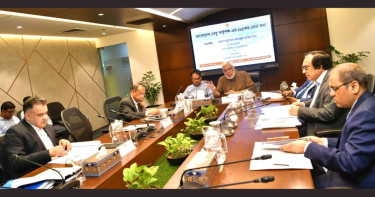More News
Trending
- EV sector rises, charging network lags behind
- BNP candidate stages daylong sit-in on Dhaka-Chattogram highway
- Unity is victory, division is decay
- Be ready for 21st-century challenges, Army Chief tells Bangladesh Infantry Regiment
- Development budget cut by Tk30,000 crore
- Riyadh’s Al-Suwaidi Park turns into mini Bangladesh
- Referendum, nat’l polls on same day: CA
- One vote on 4 points could confuse voters, warn experts
- I never issued any order to fire on unarmed civilians, Hasina tells BBC
- Polls to be inclusive; AL won't be able to take part: CA Yunus
- UK minister calls on Chief Adviser
- Top officials hired with invalid experience certificates
- ‘Religious opportunists’ want to keep women indoors: Salahuddin
- Chief Adviser’s recent speech shows clear favouritism towards a single party: Taher
- Bangladesh seeks urgent adaptation finance at COP30
- ‘Ishara’ receives warm reception from audience
- Sewing training centre opens for underprivileged trainees in Moulvibazar
- Trump sprays Syria’s Al-Sharaa with perfume, asks how many wives he has
- Osman Hadi receives death threats from 30 numbers
- ‘Audience will always be there only if the story is solid’
- ‘JnUCSU Photo Contest’ kicks off 16 November
- Apple and OpenAI must face X Corp's lawsuit for now, US judge rules
- US pressures UN Council to adopt Trump’s Gaza peace plan
- Lack of control over hybrid seed prices burdens Sunamganj farmers
- Health diplomacy: New Rx for China-Bangladesh friendship
- Hasina’s fate to be sealed on 17 Nov
- Khalilur to attend Colombo Security Conclave meeting in New Delhi next week
- Nagad urges customers not to worry about Google Play Protect warning on app
- Sramik Dal leader shot dead in Rangunia
- Sewing machines distributed to trainees in Bhola





